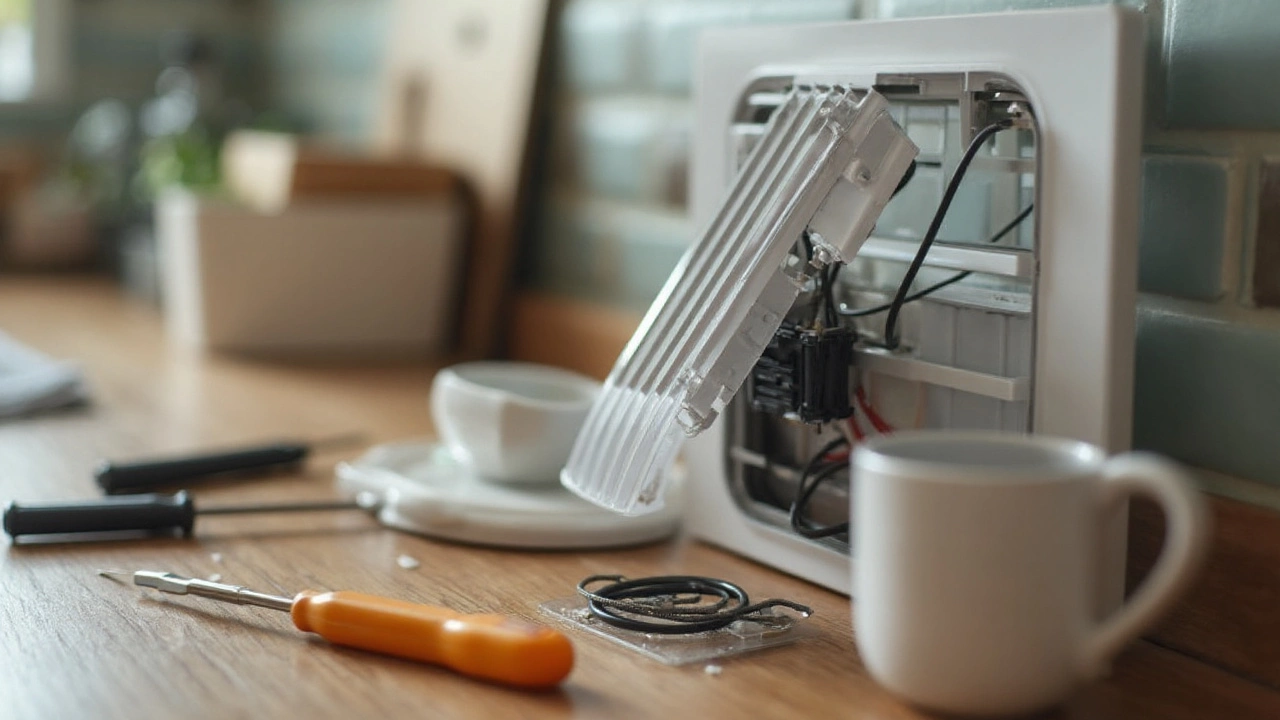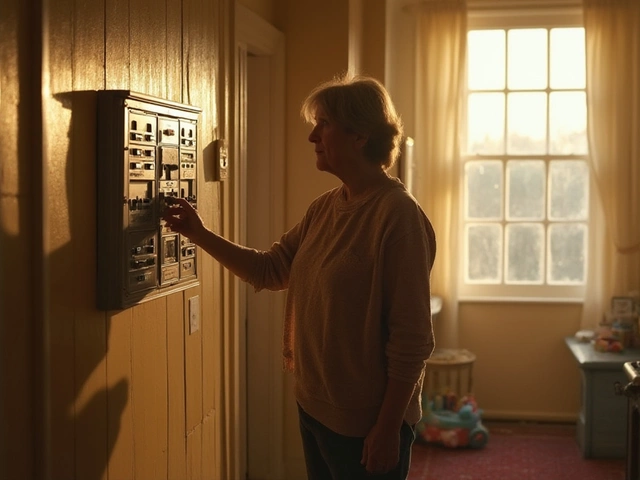Imagine you’re standing in your steamy bathroom. The mirror’s fogged up, the paint’s starting to peel, and you swear you can actually see the damp crawling up the walls. That extractor fan you’ve ignored for ages has finally given up. Now what? Who do you call? Can an electrician sort your extractor fan or are you stuck hunting for some obscure specialist? Let’s clear away the confusion.
Who Fixes Extractor Fans: The Real Deal
So, you’re eyeing that dud extractor fan and wondering if calling an electrician is the right move. Here’s the deal: most electricians handle extractor fan repairs. Extractor fans are electrical appliances fitted in bathrooms and kitchens to remove moisture, grease, and odors. When they stop working, it’s not just about losing a luxury—it’s often a matter of health (hello, mold) and home safety. Since most extractor fans are hardwired and run on your home’s electrical circuits, electricians are literally trained for this kind of work. It’s their bread and butter.
If you look up the UK’s Building Regulations (think official rulebook for homes), it actually mentions ventilation as a fundamental requirement for bathrooms and kitchens, and licensed electricians are usually authorized to install or fix extractor fans. The same goes in most US states and European countries. Why? Because there’s actual risk involved. Faulty wiring, blown fuses, poorly connected switches… these can all lead to electrical fires or at the very least, a useless fan.
An electrician can diagnose typical causes of failure like dead motors, blocked impellers, seized bearings, or faulty switches. They’ve got the testing gadgets and know-how to check wiring continuity, voltage, and extraction rate. If your fan is connected to the light switch and that’s gone weird too, it’s definitely an electrician’s territory.
Some folks think calling a handyman will do, but unless the job is purely cosmetic or mechanical (like cleaning or changing a grill), anything involving wiring or connections belongs to a certified electrician. Insurance and warranties get fussy if things go wrong, and any wiring update must meet safety codes.
Common Problems With Extractor Fans and How Electricians Solve Them
Let’s break down what usually goes wrong with extractor fans. Most issues fall into these buckets:
- Electrical Faults: These are by far the top reason fans give up. Loose wiring, blown fuses, or tripped breakers are common. Electricians fix these safely and restore power.
- Motor Failures: Motors in fans can wear out, overheat, or seize, especially when clogged with dust. An electrician tests the motor for continuity and performance and swaps it if needed.
- Faulty Switches or Timers: Some fans use timer switches or humidity sensors that can fail. Electricians often have spare parts in the van to replace them quickly.
- Blocked or Dirty Parts: Fans clogged with dust, paint, or even insects run slower or not at all. While a really basic clean is your DIY job, if deep cleaning involves taking the fan apart or checking behind the ceiling, better leave it for the pros.
- Noise and Vibration: Worn bearings or loose mounts cause nasty rattling. Electricians check the housing and mounting points, and sometimes fit anti-vibration gaskets or pads.
Here’s what a typical call-out looks like: the electrician arrives, switches off the circuit, checks the fan with a tester, inspects wiring, and diagnoses the problem. If the fan is ancient or non-standard, you might get advice to upgrade, since newer fans are ultra-efficient and way quieter (sometimes below 25 dB—like a whisper). They’ll test airflow rates too, because if it’s not shifting enough air, you’ll still get mold on your bathroom ceiling. Extraction rates are measured in liters per second or cubic meters per hour. For bathrooms, anything above 15L/s is usually enough, while for kitchens the number’s up into the 60s. Don’t worry, electricians have meters for this.
Electricians also know ventilation regulations backward; for example, in the UK, fans in wet rooms must have at least IPX4 rating for splash protection. If you live in a rental, you’re often required by law to keep working extraction in kitchens and bathrooms. Many landlords hire electricians for annual checks, because landlords face fines if mold and damp set in because of broken fans.
| Extractor Fan Issue | DIY Fix? | Electrician Needed? |
|---|---|---|
| Dead fan, won't turn on | No | Yes |
| Noisy or rattling sound | Maybe (clean/check)* | Yes (if disassembly or new parts required) |
| Fan works, but doesn't extract air | Maybe (clean vent) | Yes (for deeper issues) |
| Broken timer or switch | No | Yes |
| Bad smell or smoke | No | Yes (urgent!) |
*You can give the fan grill a wipe, but dismantling the whole thing can be risky if you’re unsure what you’re doing.

Electrician vs. Specialist: When Do You Need Something More?
Once in a blue moon, you’ll need more than just your go-to electrician. Maybe the extractor fan is connected to a seriously complex HVAC system that spans your house, or maybe it’s part of a modern smart home setup (there are extractor fans now linked to Alexa, believe it or not). In these weird cases, you might need a ventilation engineer or a home automation specialist.
Typical extractor fan in your average home? Nope, an electrician has you covered—even if the fan is on a weird timer, a humidity sensor, or piggybacks off your light circuit. In fact, most major extractor brands (like Xpelair, Vent-Axia, or Manrose) expect their products to be fitted by electricians—they often say so in the warranty paperwork.
By law, especially in the UK and Europe, anything that requires fresh wiring, drilling through external walls, or connecting to the main power supply is legally an electrician’s job. DIY wiring isn’t just dodgy, it can void your home insurance or even trigger a failed home sale down the road. If the repair means taking out your old fan, drilling a new vent, or patching the wiring, it’s best to call a professional. Go online and you’ll see thousands of questions every year about failed fan repairs, most starting with “I tried to replace my extractor fan and...” then they hit a wall when it doesn’t run, or the fuse keeps blowing.
What’s the main thing to look for in an electrician? Credentials and experience. Certified electricians usually belong to a recognized trade body, like NICEIC or NAPIT in the UK. They’ll sort your fan safely and can sign off on Part P compliance (in the UK, basically proof that the work meets code). Pro tip: keep all paperwork! Maya—my wife—insisted we keep our installation certificate after our kitchen upgrade, and weirdly enough, it helped us dodge a snag during a remortgage.
For extractor fans above a cooker hood (kitchen hobs), things get a tad trickier—UK law says any work above a “wet area” must have special electrical safety approval. In the US, check with your local authority, as the National Electrical Code sometimes kicks in.
Electricians are usually faster and more affordable than calling niche “fan repair” technicians. Most standard jobs (fixing a single bathroom fan) take less than an hour and cost between £60-£100 in the UK or $75-$120 in the US (as of late 2025). More complex stuff—like rewiring, fitting a new duct, or adding switched timers—bumps the cost up, but it’s money well spent for peace of mind.
A 2023 report by the Electrical Safety First charity found that 37% of household ventilation fires started with DIY wiring mistakes in kitchens or bathrooms. — Electrical Safety First Annual Report 2023.
Tips for Maintaining Extractor Fans and Saving on Repairs
Regular care can make your extractor fan last a decade or more. You don’t need to be an expert, just remember the basics. First, clean the grills and nearby area now and then. Dust, grease, and even hair love sticking to extractor covers, blocking airflow and overloading the motor. I do this with a soft brush or the small nozzle on my vacuum.
If your fan sounds slightly off—making a high-pitched whine, clicking, or buzzing—don’t ignore it. That’s usually the motor struggling or the bearings needing attention. A stitch in time here really does save a massive bill later. Try running the fan while you shower, then keep it on for at least 15 minutes after (most modern models have a built-in timer for this).
For kitchen fans, always use the extractor when frying, boiling, or grilling. Grease builds up shockingly fast, and clogged fans capture odors but move less air through. Some models let you change the filter yourself—read your booklet first, then give it a go if it looks straightforward.
If you’ve got a humidity sensor (especially in bathrooms), test it twice a year. Trick: with steam from a kettle or a hot shower, see if it automatically triggers the fan. If it doesn’t, or if it keeps running forever, flag it for your next electrician visit.
When buying a new fan, pick one that’s easy to open for cleaning and has a replaceable filter if you use it in the kitchen. The extra couple of pounds or dollars is totally worth it on cleaning day. Low-energy (EC) models use a fraction of the power of old ones—think 4-8 watts instead of 15-30—and are nearly silent.
Keep an eye on the room after months of use. Are there black spots on the ceiling, weird patches on tiles, or persistent bathroom odors? These are warning signs. An electrician will check if your duct is blocked, or if airflow isn’t reaching outside properly. Mice, birds, and insects sometimes move in or build nests in vents, especially if there's a broken cap outside.
If you ever see smoke, smell burning plastic, or feel buzzing from the fan body, shut it off at the fuse box and call an electrician, no negotiation. That’s a real hazard—motors and wires melting behind the plaster or tile. Insurance might not cover fires from faulty electricals unless you’ve had them inspected and maintained by a qualified electrician. That’s not just a technicality; it’s literally what the policy wording says.
Want to go high-tech? Smart extractor fans can link up with your home Wi-Fi and auto-run based on humidity or your voice commands. These cost a bit more up-front, but you save on panic repairs and can keep tabs on air quality trends in the app if you’re so inclined. Plus, electricians are quickly getting up to speed on smart installs—no more blank stares if you ask about “Alexa compatibility.”
So yes, when your extractor fan is failing—the electrician is your guy. They’ll spot wiring issues, diagnose odd noises, install upgrades, and make sure your home’s air stays fresh, safe, and mold-free. Spare yourself the drama of bodging it. Get it fixed right, and breathe easy (literally).





